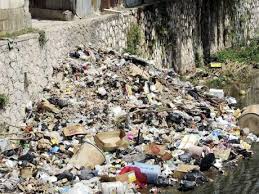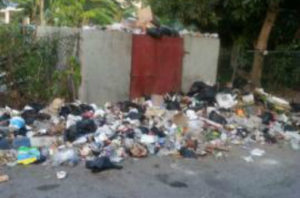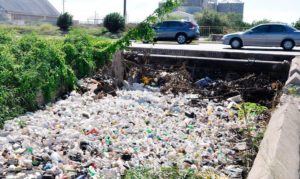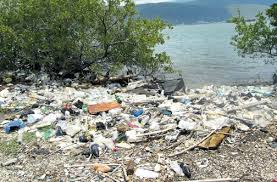Once upon time, in a small, quiet community in West Rural St. Andrew, a homeowner came from work one evening confronted by the sight of an old white station waggon on blocks, on the sidewalk almost opposite his front gate. It was a jarring sight: this old, disabled car, an ugly blemish on the green, rustic landscape. Days passed, each day seeing another part of the car missing. One day it had only one door instead of two. The next day, the bonnet was gone. On yet another day, the dashboard had been taken. The car was being scrapped right on the sidewalk, in the middle of this small, quiet community.
The homeowner typically left for work by 7am and returned home after 7pm. He relied on his housekeeper to inform him of the activity around the (not so) abandoned car. She reported that the car’s owner had some connection to the house opposite his…he helped to build it, he claimed, and it was actually his mother’s property, now rented out. He promised that the car would be moved, that he just needed a little more time.
After six weeks of facing this almost shell of a car wreck on blocks, in front of his gate, the homeowner reported the matter to the local police. He reasoned that sufficient time had elapsed and he preferred not to get into an argument with someone who appeared to be comfortable with scrapping a car piece by piece on the sidewalk over an extended period of time. Furthermore, any opportunity to interact with the scrapper would demand a change to his own schedule, awaiting Mr. Scrapper’s attendance at the wreck. This matter of a scrapped car, perched on blocks on the sidewalk, was most certainly an issue of law and order, easily dealt with by the police, he reasoned.
He was in for a rude awakening.
Ten weeks elapsed, and the shell of the car was still on the sidewalk opposite his gate. One morning, Mr. Homeowner’s wife was leaving for work and she saw two men “working” on the car. She stopped and attempted to pleasantly engage the men, seeking to elicit some sort of timeline and commitment for disposing of the wreck. She was greeted with hostility from one of the men who claimed ownership of the wreck. He angrily sought to justify the presence of the wreck on “his sidewalk” since the sidewalk adjoined “his mother’s house, the house weh him broad out him back fi help har build!” He went on to rant about the homeowner going to the police instead of trying to find him first, and declared “ah nuh so we fi live!”. Mrs. Homeowner, a bit intimidated, but resolute, politely ended the discussion with: “Anyway, it really doesn’t belong here. Please seek to get it removed sooner rather than later.”
Twelve weeks elapsed, and the wreck was still on the sidewalk. By this time, it was a mere chassis. Note that at the end of 6 weeks having not heard from the police or seeing any resolution, Mr. Homeowner stepped up inquiries of the local police. He made a total of 7 visits to the police station, spoke with a superintendent of police on the matter and went on to report said issue to a senior superintendent of police. In discussions with the police, Mr. Homeowner confirmed that the property was not stolen, and the person responsible was known to the police and was being ‘given time’ to remove the item and clean the mess. Mr. Homeowner remains adamant that the presence of this shell and garbage is a public health and security risk.

In reviewing this story and how it might play out, the “Broken Windows Theory” immediately came to mind. The Broken Windows Theory, posited by Wilson and Kelling in 1982, seeks to make a link between disorder and more serious crime. The theory was born out of the following observations and reasoning: a building with a few broken windows is likely to have other windows broken by vandals eventually, said vandals going on to eventually break in and even become squatters. Consider also a clean sidewalk. Some litter accumulates. This leads to more litter. And even more litter as people conclude that this is an unpoliced situation where anything can and does go.
Wilson and Kelling maintain that disorder, while not directly linked to more serious crime, certainly leads to increased fear and withdrawal from residents, which creates a context for more serious crime to flourish. Residents will grow cynical as to the role and efficacy of the police, and fail to report violations they see or experience. Persons of mal-intent will quickly identify this context as one where they can do as they like and more than likely get away with it.
That the actions of the man scrapping this car on the sidewalk are against the law is beyond debate. His actions constitute a breach of section 45 & 46 of the National Solid Waste Management Act.
Section 45 definitively states that every person who disposes of solid waste in any area or in any manner not approved by the Authority…commits an offence and shall be liable on summary conviction before a Resident Magistrate to a fine not exceeding one million dollars or to imprisonment for a term not exceeding nine months or to both such fine and imprisonment
Section 46 continues: (1) A person commits an offence if he- (a) throws, drops or otherwise deposits and leaves any litter in any public place; or (b) erects, displays (whether by writing, marking or otherwise), deposits or affixes anything in a public place or on any building, wall, fence or structure abutting or adjoining a public place, in such circumstances as to cause, contribute to or tend to the defacement of that place, building wall, fence or structure, as the case may be, and shall be liable to a penalty under section 53.
The law continues to guide law enforcers as to their response to breeches of this act in Section 53: Where an authorized officer finds a person on any occasion and has reason to believe that on that occasion that person is committing or has committed an offence to which this section applies, he may serve that person with the prescribed notice in writing offering the discharge of any liability to conviction of that offence by payment of a fixed penalty under this section…
To provide even more clarity, here are definitions under the law that remove all doubt as to the legality of the scrapping and abandoning of the car on the sidewalk:
“authorized officer”: any member of the Jamaica Constabulary Force
“litter”: solid waste in any public place and includes any refuse, rubbish, bottles, glass, debris, dirt, rubble, ballast, stones, noxious or contained substances or waste matter or any other matter likely to deface, make untidy, obstruct or cause a nuisance in a public place
“public place”: includes every public highway, street, road, square, court, alley, lane, bridle way, footway, parade, wharf, jetty, quay, bridge, sidewalk, verge;
After twelve weeks and numerous reports, Mr. Homeowner has reasonably concluded that the police have failed to uphold the law in this situation. The police have been unresponsive. The chassis remains on the sidewalk. Mr. Scrapper remains free. The police, by refusing to act decisively and uphold the law where this scrapped car is concerned, have now created a context that exposes this community to the possibility of even more serious crime.
Indeed, the police have spoken to the offender. This is evidenced by Mr. Scrapper’s anger when speaking to Mrs. Homeowner. One gets the feeling that the police have framed their discussion with this known offender from the point of view of the homeowner: “Mr. So and So wants you to move that car from in front of his home” rather than framing the offence from the point of view of the law! Had the police engaged him by pointing out the offence as it is framed in law, they could have prevented the tension that exists because Mr. Scrapper feels that Mr. Homeowner “a give him a fight.” There are too many examples in Jamaica of lives being lost as a result of interactions borne out of unchecked, escalating tensions between parties; disorder giving rise to so called serious crime.
If Mr. Homeowner sees suspicious activity in a nearby residence, who could blame him if he opts not to report it to the police? He can reasonably conclude after all, that the police are selective in how they go about serving, reassuring and protecting. More serious crime can potentially move in to this community now in the face of decreased levels of informal social control.
The Broken Windows Theory and policing are not without criticism. There are studies showing that zero tolerance has led to uneven prosecution in some areas, minorities being targeted and punished for very minor infractions at a higher rate than their white counterparts in the USA for example.
It would suit the police and political directorate here in Jamaica to consider this approach to crime fighting, however. We have seen a general decline in law and order: loud music way into the night, filthy cities and communities, deliberate ignoring of zoning laws in residential neighbourhoods seeing a rise in commercial activity, savoury and otherwise (think massage parlours) increased road fatalities from reckless driving and on and on. What have we to lose from an approach that treats with such offences as prescribed by the law? The police appear to be selective in which laws they opt to enforce and how they enforce them. This surely is not their right!
After three months, the police still have an opportunity to do the right thing and re-establish a context of law and order in that West Rural St. Andrew community where a scrapped chassis remains a blemish, health risk and security risk, and an obvious affront to the laws of the land. They must immediately act as the law demands, making it clear that the offender’s actions go beyond upsetting Mr. Homeowner, that they are in clear contravention of the law. They still have an opportunity to act and in so doing, dissuade potential lawbreakers seeing a slow decline in standards in the community from adding to the disorder. They still have an opportunity prevent and possibly reverse the disenchantment and resentment that Mr. Homeowner and his family may feel, maintaining these critical allies, the citizens, without whom crime fighting can never work.
Selective enforcement of the law strips the police of legitimacy, rendering their efforts at crime fighting null and void.
Were this another community, say Kingston 8, or were the sidewalk in front of the Prime Minister’s residence or in front of Mr. Captain of Industry’sor indeed in front of the Commissioner of Police’s residence, would the police response to an abandoned chassis be the same as it has been in this West Rural St. Andrew community? On what basis does the police decide which laws to enforce and when? “To Serve, Protect and Reassure” is the stated motto of the Jamaica police. Their lack of responsiveness to an action that is in direct contravention of the law of the land suggests that their motto would more accurately read: “To serve, protect and reassure those who matter…”




